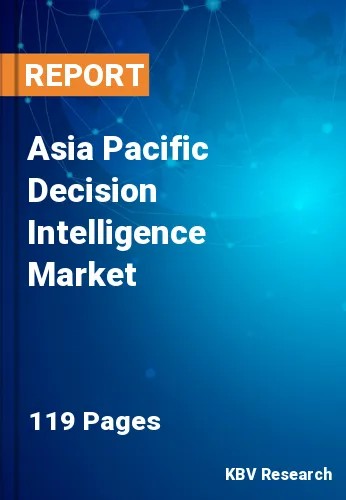The Asia Pacific Decision Intelligence Market would witness market growth of 18.3% CAGR during the forecast period (2022-2028).
Modern commercial decision-making requires the use of machine learning modeling. Through identifying potential chances for future improvements in outcomes, predictive analytics elevate segments and relationships from Automated Insights to the next level. Telling a story makes it easier to provide in-depth analyses and insights to affect decisions. Automated Data Storytelling, which provides succinct, decision-centric insights, visualizations, and NLG-based summaries, is a characteristic of best-in-class platforms.
Similar to the escalating degrees of autonomy in aided driving, there are three levels during which DI can support business choices. The first level is decision support, where computers offer fundamental capabilities like alerts, analytics, and data exploration to assist human decision-making. People solely choose the choices themselves.
The second decision-making stage is decision augmentation, wherein machines take on a bigger and more active role. They perform data analysis and produce forecasts and recommendations for human decision-makers to examine and confirm. For instance, humans can follow the computer's recommendations by simply doing so or collaborate with the machine to change the recommendation.
The Asia Pacific region holds great promise for decision intelligence, which blends statistics, game theory, psychology, design analytics, artificial intelligence, user experience, machine learning, and data science. Businesses across Asia can very well use engineered decision making for significant and reliable positive decision making, given the obvious shortage of Data Scientists and Engineers and the prospect of massive automation and AI/ML initiatives in the region. Asia is the finest location to be because of this, as well as the CHRO-CIO partnership regarding Super Teams and Digital Transformation in the APAC area. As a result, these elements are fostering the development of the Asia Pacific decision intelligence market.
The China market dominated the Asia Pacific Decision Intelligence Market by Country in 2021, and would continue to be a dominant market till 2028; thereby, achieving a market value of $2,052.6 million by 2028. The Japan market is estimated to grow a CAGR of 17.6% during (2022 - 2028). Additionally, The India market would experience a CAGR of 19% during (2022 - 2028).
Based on Deployment, the market is segmented into Cloud and On-premise. Based on Component, the market is segmented into Platform, Solution and Services. Based on Platform Type, the market is segmented into Integrated and Standalone. Based on Organization Size, the market is segmented into Large Enterprises and SMEs. Based on Vertical, the market is segmented into BFSI, Telecom & IT, Healthcare, Retail & Consumer Goods, Manufacturing, Government & Defense, Energy & Utilities, Transportation & Logistics and Others. Based on countries, the market is segmented into China, Japan, India, South Korea, Singapore, Malaysia, and Rest of Asia Pacific.
Free Valuable Insights: The Worldwide Decision Intelligence Market is Projected to reach USD 26 Billion by 2028, at a CAGR of 17.5%
The market research report covers the analysis of key stake holders of the market. Key companies profiled in the report include Oracle Corporation, IBM Corporation, Microsoft Corporation, Intel Corporation, Google LLC (Alphabet Inc.), Domo, Inc., Board International S.A., Provenir, Pyramid Analytics BV, and H2O.ai, Inc.
By Deployment
By Component
By Organization Size
By Vertical
By Country
Our team of dedicated experts can provide you with attractive expansion opportunities for your business.

